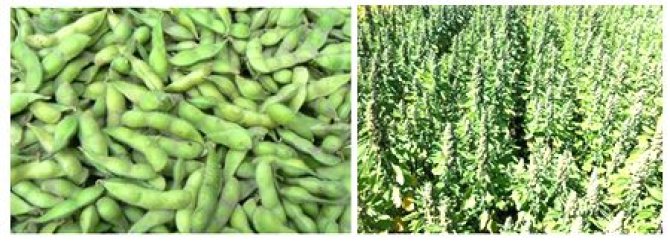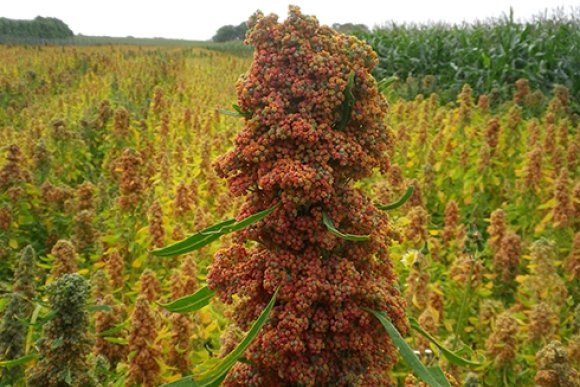Better products, new crops
Our experts direct their efforts to improving existing crops and developing new ones, like soya and quinoa. We focus on the crop in its entirety and seek out specialist knowledge, such as crop protection and weed control, found throughout the organisation. We also apply this broad approach to the economics of cultivation.
We also research the cultural and utility value of diverse crops for Plantum, an umbrella organisation for Dutch cultivation enterprises. Objective testing conducted on new varieties is used for an annual update of the Catalogue of Recommended Varieties for each crop. This catalogue informs growers about the advantages of the newest varieties, which in turn contributes to higher yields.
New crops, new cultivation methods
In recent years, the interest in cultivation has risen markedly. Wageningen University & Research studies both new crops and, on occasion, forgotten crops for which there is renewed interest. We often collaborate with partners from the business community in our work to introduce new crops. For arable farmers and vegetable producers looking to introduce new crops, we answer questions pertaining to a wide range of topics such as cultivation, storage and processing in the chain.
For instance, we have been researching the introduction of soya in the Netherlands for several years, and are examining the possibilities of producing this crop under Dutch growing conditions. Our research efforts are also directed at oregano as an alternative to antibiotics in animal feed. And, in recent years, we have contributed to the successful introduction of new crops like quinoa, tagetes and hemp..

Cultivating new crops raises questions
Cultivating new crops raises a myriad of questions. Besides questions about cultivation techniques, there are also questions about the sustainability of crops, sales opportunities, disease prevention and anticipated balance.
For companies with questions about the feasibility of cultivating a new or an existing crop, we first analyse every aspect of the cultivation process, as well as the new and existing chains. In consultation with the relevant partner, we develop an action plan to address questions about what is required for the sales chain in terms of variety, quality and nutritional value.
Testing in pilots
We first test new crops on a pilot scale before advancing to trial plots. We have extensive machinery for all types of seeds, tubers and crops, including various types of: seeders, fertiliser spreaders, sprayers and harvesting machines that can handle both small experimental plots and large trial plots.
Our strength lies in our ability to combine our knowledge of crops with that of our network contacts and our clients, such as seed strain improvement companies. Our test locations are established at sites that contain the different types of soil in the Netherlands, and they have extensive machinery and specialists available for every type of cultivation.
Our well-equipped laboratory facilities are equipped to study and measure the quality of the cultivated crops, disease resistance and plant susceptibility to soil-based and airborne pathogens. The unique combination of our expertise, facilities and extensive network makes Wageningen Plant Research an ideal partner for research on existing crops and on new, alternative crops in particular.
Read more:
Want to know more about new crops?
Precision agriculture
No two plants or locations in one field are the same: one location in the soil may have slightly less nitrogen while the other has a pest infestation or weeds. Understanding that certain plants need additional fertiliser while others are likely to develop disease allows those in the know to take action.
The problem, however, is that growers cannot always see or make an accurate assessment of this. This means that spraying is often (or even too often) used preventively, and it does not have the optimal dosage or it is deployed too late. Supplementary fertiliser is also common, even though the soil is sufficiently rich in nutrients. These inefficient practices result in more fertiliser being used than is strictly necessary, and they increase the risk of fertilisers leaching into surface water. The solution is precision agriculture.
With the aid of precision agriculture, we can increaser farmers' yields while helping to improve the water quality. Sensors measure soil characteristics (pH and organic material, for example) and the reflection of the crop.Combining this data with the yield variance of a plot creates options to lime and fertilise plots at specific locations on the basis of a task card. This also applies to the dosage of various plant protection products.
Developing effective operations and computation models
Our experts develop effective operations and computation models. The information gathered from the sensors should lead to dispensing the correct amount of fertiliser for the plants. It is also possible to use computation models to better predict the final harvest yield. We set up these computation models and then test the results through field trials.
Apps and programmes
In order to utilise this knowledge for farms, the knowledge gleaned from the testing is translated into an app. These programs make it as easy as possible for growers to obtain advice. This advice may relate to spraying or fertilising at the appropriate time, using the right tools (or fertiliser) and the proper dosages. This is increasingly combined with a task card that enables place-specific application. The open platform Akkerweb provides growers with direct access to the apps, so a similar task card can be produced at a lower cost.
Learning modules
We also share this knowledge via learning modules for secondary and higher agricultural education. Students can simulate precision agriculture at their desks, after which they venture into the fields for first-hand experience with the equipment. This is how we train the farmers of the future to deal with new techniques, and we are working together on improving crop efficiency and on a more sustainable agricultural sector.
Want to know more about precision agriculture?
Variety research
A farmer can only choose the best variety if it has been independently compared and evaluated. Our experts conduct extensive research into varieties. The outgrowth of this research is the annual Catalogue of Recommended Varieties for agricultural crops, which growers can consult to make informed selections.
A new variety from a grower only reaches the market after it has been thoroughly tested by independent researchers. At different sites, these researchers test varieties according to standard protocols for issues such as disease susceptibility and yield. If the new variety is an improvement on the existing ones, it is added to the National Catalogue.
The Catalogue of Recommended Varieties
The Commissie Samenstelling Aanbevelende Rassenlijsten (CSAR) selects the top performing varieties, which are directly added to the Catalogue of Recommended Varieties. Growers consult this catalogue when selecting varieties for their farms.
Our researchers perform comparative research on varieties for diverse crops. This research involves cereals, maize, flaxseed, chicory, onions and recreation grasses.
Research into varieties increases yields
The working method of combining independent research with the Catalogue of Recommended Varieties encourages growers to introduce new varieties into their production. WUR researchers have discovered that, over the years, this has already led to a substantial increase in yields. They have been conducting comparative studies on varieties for more than thirty years. And during this time span, grains have experienced a 25% increase in yields.
Read more:
- www.rassenlijst.info (in Dutch)


